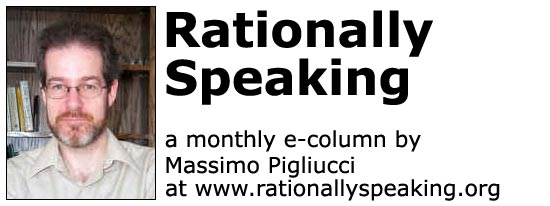|
|
|

N. 51, July 2004: The Neurobiology of Regret |
This column can be posted for free on any appropriate web site and reprinted in hard copy by permission.
If you are interested in receiving the html code or the text, please send an email
Massimo examines the organic root of counterfactual thinking, and its implications.
|
Will biology ever be able to explain the human mind? Some embrace such possibility with eagerness, considering it (correctly) yet another blow to mysticism and religious thinking. Others, for the same reasons, very much fear any hint that science is moving in that direction, desperately resisting a naturalistic interpretation of human thought.
Most (but by no means all) philosophers of mind — while fiercely debating where a naturalistic answer to the problem of mind may come from and what form might it take — have settled on what is often referred to as the “no ectoplasm clause.” In essence, this says that regardless of what else may be involved in producing consciousness, feelings, and thoughts, these simply cannot happen unless there is a live brain in the picture.
The no ectoplasm clause is, naturally, shared also by scientists looking into these questions, and recently a group of cognitive scientists have made spectacular progress in the understanding of one of the most characteristic and interesting human emotions: regret. The paper by Nathalie Camille and colleagues, published in the May 21, 2004 issue of Science, focused on the analysis of regret in normal people when compared to individuals with lesions in a particular area of the brain known as the orbitofrontal cortex. They chose this brain region because it is known to be connected both with areas involved in reasoning and planning (such as the dorsolateral prefrontal regions), and with those devoted to emotions (like the amygdala in the limbic system).
Why are reasoning, planning and emotional reactions important to the study of regret? Because the latter is known to be an emotion triggered by another peculiarly human (as far as we know) mental characteristic: counterfactual thinking. At the most sophisticated level (say, philosophical analysis), counterfactual thinking is what allows us to “run” thought experiments in our mind. More commonly, it is the ever-present “what if” part of everyday thinking which plays a crucial role in evaluating different possible scenarios following some action that we are considering taking (or not taking). More speculatively, counterfactual thinking may have been crucial to the survival of early humans, allowing them to plan ahead important aspects of their lives, such as group hunting.
Regret, then, emerges from the feeling of disappointment when we contrast the actual outcome of our actions to some possible (more favorable) outcome that our counterfactual thinking allows us to imagine (the question of whether such counterfactual scenarios are themselves reasonable or not is an entirely different matter). That is why Camille et al. studied regret in people with damage to the orbitofrontal cortex: the hypothesis was that these individuals, unlike normal human beings, would be unable to experience regret, because their cognitive and emotional pathways were uncoupled by the brain injury.
The cognitive scientists tested their hypothesis by exposing normal individuals and damaged patients to a gambling scenario on a computer. After each trial, the subjects were asked to rate their own emotional reaction to the outcome (on a scale from very unhappy to very happy), and they were also measured for physiological markers (skin conductance) of disappointment and regret (the latter two are distinct reactions, the first of which does not involve counterfactual thinking).
The results were as clear as one could have hoped for: disappointment (learning one had lost the gamble) turned into the stronger emotion of regret (when one acquires knowledge of what would have happened if one had chosen the alternative action) in normal individuals. Patients with orbitofrontal damage, however, experienced disappointment, but no regret whatsoever, in accordance with the hypothesis that — while still interested in the outcome of their gamble — they were incapable of emotionally processing counterfactual thinking.
The authors of the study concluded that: “It is the counterfactual thinking between the obtained and unobtained outcomes that determines the quality and intensity of the emotional response … The absence of regret in orbitofrontal patients suggests that these patients fail to grasp this concept of liability for one’s own decision that colors the emotion experienced by normal subjects.”
The science brings us up to this point, at least at the moment. But philosophy allows us to speculate a bit further (while still grounding ourselves in logic and evidence, of course). For example, one can begin to wonder if the occasional vicious monster who commits hideous crimes and bluntly shows no regret for what he has done, doesn’t have something wrong with his orbitofrontal cortex. This is an eminently testable hypothesis, thanks to modern brain scanning techniques. If we also consider recent findings about certain types of brain damage affecting human’s ability to engage in moral reasoning (e.g., de Oliveira-Souza, Neurology, vol 54, p. A104, 2000), we are inevitably led to questions about the limits of moral responsibility, the reasonableness (or lack thereof) of punishment, and how much elbow room (to use philosopher’s Daniel Dennett’s famous metaphor) we should reserve for free will. These are deep questions at the interface between science and philosophy, and both disciplines are providing us with much better tools than classical mysticism or supernaturalism to understand important aspects of what it means to be human.
Read or Add Comments about Rationally Speaking
|
Massimo’s other ramblings can be found at his Skeptic Web.
Massimo’s books:
Denying Evolution: Creationism, Scientism, and the Nature of Science

Tales of the Rational: Skeptical Essays About Nature and Science
|
|
|
Back to Rationally Speaking
|
![]()